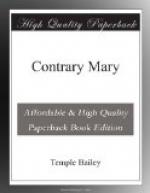“They don’t get killed,” said Barry easily. “The hospital is full of those who get hurt, but it is good for them; it teaches them to be cool and competent when real danger comes.”
And now came the artillery, streaming through that sun-lighted entrance, the heavy wagons a featherweight to the strong, galloping horses. Breathless Leila watched their manoeuvres, as they wheeled and circled and crisscrossed in spaces which seemed impossibly small—horses plunging, gun-wagons rattling, dust flying—faster, faster—— Again she shut her eyes.
But Mary Ballard, cheeks flushed, eyes dancing, turned to Porter. “Don’t you love it?” she asked.
“I love you——” audaciously. “Mary, you and I were born in the wrong age. We belong to the days of King Arthur. Then I could have worn a coat of mail and have stormed your castle, and I shouldn’t have cared if you hurled defiance from the top turret. I’d have known that, at last, you’d be forced to let down the drawbridge; and I would have crossed the moat and taken you prisoner, and you’d have been so impressed with my strength and prowess that you would——”
“No, I wouldn’t,” said Mary quickly.
“Wait till I finish,” said Porter, coolly. “I’d have shut you up in a tower, and every night I’d have come and sung beneath your window, and at last you’d have dropped a red rose down to me.”
They were laughing together now, and Delilah on the other side of Porter demanded, “What’s the joke?”
“There isn’t any,” said Porter; “it is all deadly earnest—for me, if not for Mary.”
And now a horse was down; there was a quick bugle-note, silence. Like clockwork, everything had stopped.
People were asking, “Is anybody hurt?”
Barry looked down at Leila. Then he leaned toward her father. “I’m going to take this child outside,” he said; “she’s as white as a sheet. She doesn’t like it. We will meet you all later.”
Leila’s color came back in the sunshine and air and she insisted that Barry should return to the hall.
“I don’t want you to miss it,” she said, “just because I am so silly. I can stay in Porter’s car and wait.”
“I don’t want to see it—it’s an old story to me.”
So they walked on toward Arlington, entering at last the gate which leads into that wonderful city of the nation’s Northern dead, which was once the home of Southern hospitality. In a sheltered corner they sat down and Barry smiled at Little-Lovely Leila.
“Are you all right now, kiddie?”
“Yes,” but she did not smile.
He bent down and peered through her veil. “Take it off and let me look at your eyes.”
With trembling hands, she took out a pin or two and let it fall.
“You’ve been crying.”
“Oh, Barry,” the words were a cry—the cry of a little wounded bird.
He stopped smiling. “Blessed one, what is it?”




